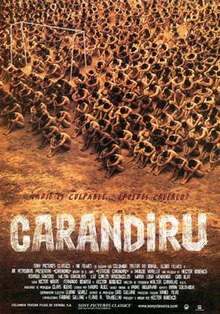| Carandiru | |
|---|---|
 Theatrical release poster | |
| Directed by | Héctor Babenco |
| Written by | Héctor Babenco Fernando Bonassi Victor Navas |
| Based on | Estação Carandiru by Drauzio Varella |
| Produced by | Héctor Babenco Oscar Kramer |
| Starring | Luiz Carlos Vasconcelos Rodrigo Santoro Wagner Moura |
| Cinematography | Walter Carvalho |
| Edited by | Mauro Alice |
| Music by | André Abujamra |
Production companies | |
| Distributed by | Sony Pictures Classics |
Release date |
|
Running time | 147 minutes |
| Countries | Brazil Argentina |
| Language | Portuguese |
Carandiru is a 2003 drama film directed by Héctor Babenco. It is based on the book Estação Carandiru by Dr. Drauzio Varella, a physician and AIDS specialist, who is portrayed in the film by Luiz Carlos Vasconcelos.[1]
Carandiru tells some of the stories that occurred in Carandiru Penitentiary, which was the largest prison in Latin America. The story culminates with the 1992 massacre where 111 prisoners were killed, 102 by Police. The film was the last thing for which the prison was used before it was demolished in 2002, one year before the release of the film.
Babenco stated that Carandiru is the "most realistic film [he has] ever made",[2] presenting a new kind of Brazilian realism inspired by Cinema Novo (not only is it meant to portray different sides of Brazil, but it was also shot on location and used many actual prisoners as actors).[3] Due to this focus on portraying reality and the film's memoir inspiration, Carandiru can be read as a docudrama or as a testimony from the prisoners.[3][4] The film was selected as the Brazilian entry for the Best Foreign Language Film at the 76th Academy Awards, but it was not nominated.
In 2015, the Brazilian Film Critics Association aka Abraccine voted Carandiru the 95th greatest Brazilian film of all time, in its list of the 100 best Brazilian films.[5]
- ^ Michael Wilmington (28 May 2004). "'Carandiru' a prison drama that grips viewers". Chicago Tribune. Retrieved 19 April 2013.
- ^ Jaafar, Ali (May 2004). "Protect and survive". Sight and Sound. 14 (5). London: 21–22, 3. ProQuest 237109313.
- ^ a b Abreu, Aida Penna Campos (2009). Brazilian docudrama: 'City of God', 'Carandiru' and 'Elite Squad' (Thesis).
- ^ Pellegrini, Tânia (July 2004). "No Fio da Navalha: Literatura e Violência no Brasil de Hoje". Estudos de Literatura Brasileira Contemporânea. 24: 15–34. ProQuest 53550864.
- ^ "Abraccine organiza ranking dos 100 melhores filmes brasileiros". Abraccine - Associação Brasileira de Críticos de Cinema (in Portuguese). 27 November 2015. Retrieved 10 August 2024.